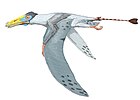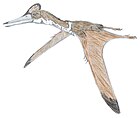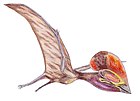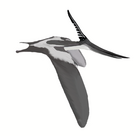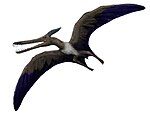Ctenochasmatidae
| Ctenochasmatids | |
|---|---|

| |
| Ctenochasma elegans specimen from Solnhofen | |
| Scientific classification | |
| Domain: | Eukaryota |
| Kingdom: | Animalia |
| Phylum: | Chordata |
| Order: | †Pterosauria |
| Suborder: | †Pterodactyloidea |
| Clade: | †Ctenochasmatoidea |
| Family: | †Ctenochasmatidae Nopsca, 1928[1] |
| Type species | |
| †Ctenochasma roemeri Meyer, 1852
| |
| Subgroups | |
| |

Ctenochasmatidae is a group of pterosaurs within the suborder Pterodactyloidea. They are characterized by their distinctive teeth, which are thought to have been used for filter-feeding. Ctenochasmatids lived from the Late Jurassic to the Early Cretaceous periods.
The earliest known ctenochasmatid remains date to the Late Jurassic Kimmeridgian age. Previously, a fossil jaw recovered from the Middle Jurassic Stonesfield Slate formation in the United Kingdom, was considered the oldest known. This specimen supposedly represented a member of the family Ctenochasmatidae,[4] though further examination suggested it actually belonged to a teleosaurid stem-crocodilian instead of a pterosaur.[5]
Classification
[edit]Below is cladogram following a topology recovered by Brian Andres, using the most recent iteration of his data set (Andres, 2021). Anders found that three subfamilies fall within the Ctenochasmatidae: Ctenochasmatinae, Gnathosaurinae and Moganopterinae, while also including several basal genera.[6]
| Ctenochasmatidae |
| ||||||||||||||||||||||||||||||
References
[edit]- ^ Nopcsa, F (1928). "The Genera of Reptiles" (PDF). Palaeobiologica. 1 (1): 163–188.
- ^ Jiang, Shunxing; Song, Junyi; Zhang, Xinjun; Cheng, Xin; Wang, Xiaolin (2023-11-15). "A new pterosaur from the early stage of the Jehol biota in China, with a study on the relative thickness of bone walls". Heliyon. 9 (12). E22370. Bibcode:2023Heliy...922370J. doi:10.1016/j.heliyon.2023.e22370. PMC 10709016. PMID 38076164.
- ^ Hone, David W.E.; Lauer, René; Lauer, Bruce; Spindler, Frederik (2023-07-14). "Petrodactyle wellnhoferi gen. et sp. nov.: A new and large ctenochasmatid pterosaur from the Late Jurassic of Germany". Palaeontologia Electronica: 26.2.a25. doi:10.26879/1251.
- ^ Buffetaut, E. and Jeffrey, P. (2012). "A ctenochasmatid pterosaur from the Stonesfield Slate (Bathonian, Middle Jurassic) of Oxfordshire, England." Geological Magazine, (advance online publication) doi:10.1017/S0016756811001154
- ^ Andres, B.; Clark, J.; Xu, X. (2014). "The Earliest Pterodactyloid and the Origin of the Group". Current Biology. 24 (9): 1011–6. doi:10.1016/j.cub.2014.03.030. PMID 24768054.
- ^ Andres, B. (2021) Phylogenetic systematics of Quetzalcoatlus Lawson 1975 (Pterodactyloidea: Azhdarchoidea). Journal of Vertebrate Paleontology, 41:sup1, 203-217. DOI: 10.1080/02724634.2020.1801703 https://www.tandfonline.com/doi/full/10.1080/02724634.2020.1801703



